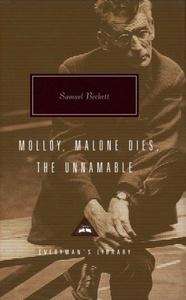Molloy, Malone Dies, The Unnamable

Editorial Everyman's Library
Lugar de edición
Reino Unido
Fecha de edición septiembre 1997
Idioma inglés
EAN 9781857152364
480 páginas
Libro
encuadernado en tapa dura con sobrecubierta
Resumen del libro
The first novel of Samuel Beckett's mordant and exhilarating midcentury trilogy introduces us to Molloy, who has been mysteriously incarcerated, and who subsequently escapes to go discover the whereabouts of his mother. In the latter part of this curious masterwork, a certain Jacques Moran is deputized by anonymous authorities to search for the aforementioned Molloy. In the trilogy's second novel, Malone, who might or might not be Molloy himself, addresses us with his ruminations while in the act of dying. The third novel consists of the fragmented monologue-delivered, like the monologues of the previous novels, in a mournful rhetoric that possesses the utmost splendor and beauty-of what might or might not be an armless and legless creature living in an urn outside an eating house. Taken together, these three novels represent the high-water mark of the literary movement we call Modernism. Within their linguistic terrain, where stories are taken up, broken off, and taken up again, where voices rise and crumble and are resurrected, we can discern the essential lineaments of our modern condition, and encounter an awesome vision, tragic yet always compelling and always mysteriously invigorating, of consciousness trapped and struggling inside the boundaries of nature.
Biografía del autor
Samuel Beckett (Dublín, 1906 " París, 1989). Tras cursar estudios en el Trinity College de su ciudad natal, fue nombrado profesor de la École Normal Supérieure de París. En esta ciudad conoció a James Joyce, de quien se convirtió muy pronto en amigo y confidente. Pariticipó activamente en la Resistencia francesa durante la segunda guerra mundial, desdeñando su neutralidad de ciudadano irlandés, y, a partir de 1945, se instaló en Francia, donde escribió toda su obra, indistintamente en inglés o francés. En 1969 recibió el Premio Nobel de Literatura; eso no turbó la vida retirada que llevó hasta su muerte. En su obra, se cuentan piezas teatrales (como Esperando a Godot, Fin de partida, Film o Pavesas), narrativa y poesía.








